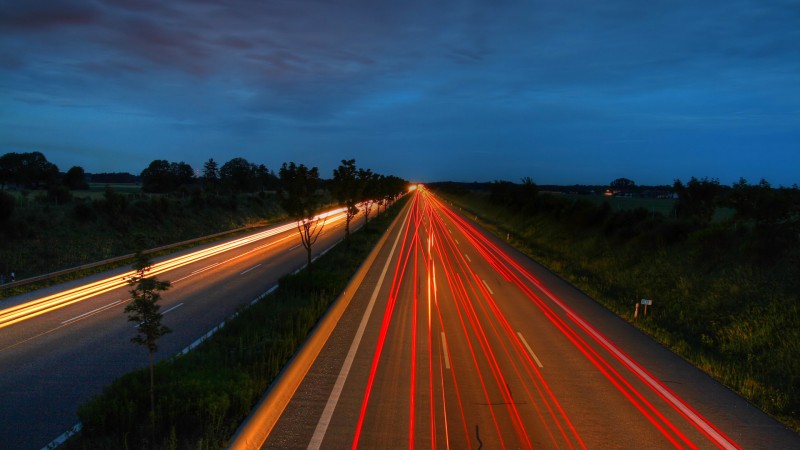
(photo: widescreenwallpapers.in)
On a dark interstate highway in western Nebraska, I was driving a ten-year-old Jeep Cherokee through a downpour, with the windshield wipers providing a steady tempo, and the headlights of semi tractor-trailer trucks shining in my mirrors. The Jeep’s cruise control had stopped working somewhere around Des Moines earlier that day. My cat, Spong, sat quietly in a carrier on the passenger seat, and all my remaining material possessions filled the back of the vehicle up to the ceiling. Everything else I owned had been left behind in a rundown apartment building in New York City. On the car stereo was some lonesome ambient music. I specifically remember Patrick O’Hearn’s Panning the Sands coming up on the playlist during this stretch of highway, and nothing else could have made for a more appropriate soundtrack. The only other sounds besides the road noise and wipers were the squeaks and rattles that Jeeps are infamous for. Spong and I had been on the road for three days already, and it would be another two days before arriving in Eugene, Oregon to an uncertain future. We had spent the previous night at a friend’s condo in Chicago, and before much longer that evening I’d be pulling into the parking lot of a motel in North Platte.
It was mid-November, 2004. A week ago I had been working for an architecture firm in midtown Manhattan, but I lost my job the day after I told my boss I’d need to take some time off to have surgery on my shoulder, which I had injured during a kayaking lesson a few weekends earlier.
In all honesty, I had never been more relieved to be let go from a job. My shoulder had been badly dislocated and was still unstable and throbbing with pain two months after the injury, but right now, I was just happy to have the East Coast chapter of my life behind me. I had been feeling increasingly burned-out with life in New York since moving there from Philadelphia earlier in the year, my career was at a dead-end, and this was the excuse I needed to leave it all behind and start a new life for myself out west. (Now that my shoulder injury was a pre-existing condition and I had no insurance, it would be another three years before I was able to have the surgery I needed. That tale is recounted elsewhere on this blog.)
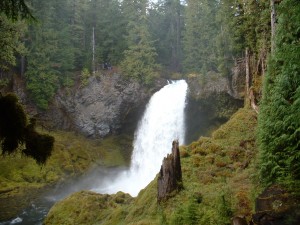 The Pacific Northwest had been on my mind a lot over the past few months. I had been spending almost every spare minute poring over the trip reports on NWHikers.net and Oregon Kayaking, and virtually exploring the region’s waterfalls via Bryan Swan’s Waterfalls of the Pacific Northwest. The lush, moss-covered forests and canyons of western Oregon seemed like the sabbatical I needed after some of the most difficult years of my adult life.
The Pacific Northwest had been on my mind a lot over the past few months. I had been spending almost every spare minute poring over the trip reports on NWHikers.net and Oregon Kayaking, and virtually exploring the region’s waterfalls via Bryan Swan’s Waterfalls of the Pacific Northwest. The lush, moss-covered forests and canyons of western Oregon seemed like the sabbatical I needed after some of the most difficult years of my adult life.
I had taken a long weekend trip out to Eugene in October, and did some exploring around the area while checking out local rental listings and the possibility of transferring to the University of Oregon to finish my undergraduate degree. One evening during that trip I was driving my rental car back to the hotel in Eugene from the coast, and I remember thinking: Here I am less than an hour from the ocean in one direction and less than an hour to the Cascades in the other direction, and I can get a two-bedroom apartment in a nice neighborhood here for $650 a month. What the fuck am I doing in New York City? At that time in New York, I was paying over a thousand dollars a month for a tiny one-bedroom apartment in a gang-infested building, where the neighbor’s loud stereo literally shook my walls until 3 AM every night. What really got me was that my friends and co-workers didn’t seem to think there was anything particularly unusual about my living situation. “Yeah, welcome to New York,” was the typical jaded response. If this is normal for New York, I thought, then fuck it.
I had gotten in touch with somebody in Eugene via a whitewater kayaking message board, and he had a spare bedroom for rent. The minute my severance check posted to my bank account, I took the train over to a used car lot in New Jersey and purchased a 1995 Jeep Cherokee I had seen advertised online. The next few days involved a household triage operation in which I sorted those things I intended to keep from those that were expendable. My furniture at this point consisted of stuff that might have been appropriate for a college dorm room, so there was no great loss there. I concentrated on my books, clothing, computer, some essential kitchen elements, and a few things that held sentimental value to me. Most everything else was placed in the apartment building’s lobby under a hand-written sign that said “COSAS LIBRES”, which Google had told me was Spanish for “free stuff”. (The literal translation, I would find out later: liberated things.) The pile had been pretty well picked over by the time I loaded up the Jeep with my essentials and hit the road.
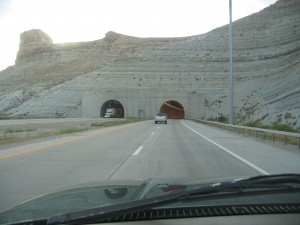
(photo: Brewdog / wikipedia.org)
The trip from New York to Eugene was mostly uneventful, but some memories still stand out. The motel room near Youngstown, Ohio reeked of cigarette smoke. In Chicago it was nice to see some old friends again, however briefly. There was that late-night rainstorm in Nebraska. Later the next day, I drove through the town of Green River, Wyoming, which stands out in my mind as one of the most depressing places I’ve ever seen in my life. The rocky hillsides were almost completely devoid of vegetation, and almost every structure and vehicle seemed to be caked in a layer of dirt. I had been looking forward to seeing the Rocky Mountains, but was disappointed to discover that I-80 mostly bypasses the mountains via a series of high desert plateaus.
That night I found myself driving through the densest fog I had ever seen, where I-84 passes through a valley in northern Utah and southern Idaho. I could barely even see past the hood of my car, so I slowed down to about 30 MPH and turned on my hazard flashers, while nervously looking in the rear-view mirror every few seconds to make sure some 18-wheeler wasn’t about to plow into me at 80 MPH. I thought about pulling over and stopping for a while, but I figured I’d be creating an even bigger traffic hazard on the side of the road, and for all I knew the fog could last for hours. I eventually found myself tailgating the vehicle in front of me just so I could follow their red tail lights. If they had gotten off the highway onto some desolate ranch exit in the middle of nowhere, or missed a curve and plunged off a thousand-foot cliff, I would’ve been following a short distance right behind them. Eventually the fog bank lifted, and I found a motel somewhere in southern Idaho to spend the night.
The following day’s journey would take me up alongside the Snake River, over Oregon’s Blue Mountains, and alongside the mighty Columbia River into Portland. Mount Hood looming above the highway was a welcome sight, because I knew it meant I was getting close. From Portland, it was a relatively short hundred miles down I-5 to Eugene.
Looking back at that road trip, I still shudder at all the things that could have possibly gone wrong. I could’ve gotten into a wreck, or somebody could have stolen the Jeep from the motel parking lot late one night, or the Jeep could’ve blown its transmission somewhere out in the middle of nowhere. I had no insurance and just enough money to pay for the trip to Oregon and my first month’s rent, so there was no margin for error. Any number of unfortunate circumstances could have left me stranded in some God-forsaken town with no money and no remaining material possessions except the clothes on my back. Thankfully, none of that happened, and I found myself pulling into my new roommate’s driveway in Eugene five days after leaving New York. I had taken a 3000-mile leap of faith and landed safely on the other side of the continent.
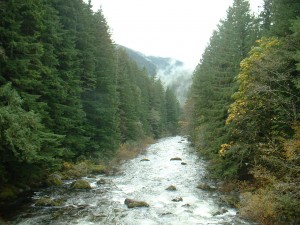 The next four months in Eugene were spent seeking employment, hanging out at the Starbucks near the University of Oregon campus, and whenever finances permitted, driving and/or hiking throughout the surrounding mountains.
The next four months in Eugene were spent seeking employment, hanging out at the Starbucks near the University of Oregon campus, and whenever finances permitted, driving and/or hiking throughout the surrounding mountains.
One of my favorite hiking destinations was the Opal Creek Wilderness in Marion County, about an hour or so from Eugene. Opal Creek came within a hair’s breadth of being clear-cut back in the 1990’s, but a determined effort by conservationists led to the area being designated a wilderness area by Congress. Today, it stands as one of the largest intact old-growth rainforests in Oregon. Mining claims in the Opal Creek watershed date back to the 19th Century, and there are a number of old abandoned mine shafts in the area. Even today, it’s not uncommon to find some people panning for gold and silver in the crystal-clear waters of the Little North Santiam River and its tributaries. The Opal Creek Wilderness is one of those magical places that, once you’ve been there, gets under your skin and never really lets go.
My residency in Oregon ended almost as abruptly as it began. I wasn’t having much success finding employment in Eugene, and with my unemployment benefits slated to expire in a couple months, the clock was ticking. Then one day I got a call from an old friend in Chicago with an offer of some long-term freelance work in exchange for free housing and a modest stipend, and while I was content with my new life in Oregon so far, it was impossible to turn down his offer. Within a few days I had said goodbye to the friends I had made in Eugene, loaded up the Jeep Cherokee once again, and headed back east. I spent the next couple years back in Chicago before deciding to give New York City a second chance in 2007, and then moved back to my hometown of Cincinnati in 2010. I began grad school at the University of Cincinnati later that year, and I’m now roughly halfway through my Masters of Architecture degree.
Looking back, the decision to leave Oregon was one of those life moments where I found myself facing a fork in the road, and while I have no regrets about the choice I made then or the choices I’ve made since then, part of me will always wonder how things would have turned out if I had chosen the other path. I return to Oregon often in my mind, and at various times since leaving, I’ve left the door open for a possible move back there. I applied to the University of Oregon for grad school and was accepted there, but I ultimately decided the University of Cincinnati made more sense for me.
I’ve always enjoyed being out on the open road, and one of my favorite stress-relief activities is to take a long Sunday drive on the back roads of Northern Kentucky. By the time I made my cross-country road trip to Oregon in 2004 I had already logged quite a few miles on the nation’s interstate highways, and I’ve logged a few more since then. The late newspaper columnist Lewis Grizzard, in one of his best pieces, nicely sums up the allure of the highway:
What I am thinking is maybe everybody ought to do this occasionally. I am at least free with my thoughts here. Out like this, a man can talk to himself and it seems perfectly natural. You can ask yourself a question on a Georgia back road and get an honest answer.
Finally, Siloam. Siloam won’t awaken for hours yet. The interstate approaches, laden with 18-wheeled monsters with big eyes and loaded backs bound for the city.
Parting with Georgia 15 is more difficult than I figured it would be. I will be home in just over an hour, but I realize that out on that primitive stretch I had maybe stumbled upon one of the modern urbanite’s last escapes. I had ridden about all that remains of the High Lonesome on a pony with automatic transmission.
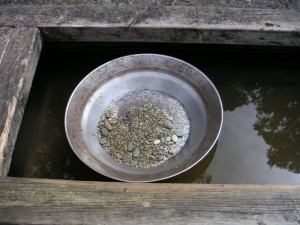
(photo: Nate Cull / wikipedia.org)
The Aboriginal tribes of Australia have a tradition known as a walkabout, in which a young man leaves his life behind and wanders the countryside for an indeterminate period of time, as sort of a spiritual quest. When he returns, he is considered an adult. In modern times, the Aboriginal walkabout is apparently done in a pickup truck at least as often as it is done on foot, but the general idea is the same.
With the benefit of hindsight, I now look back on my Oregon trip as a much-needed walkabout, a purification rite in which all that was unnecessary in my life was left behind in that shithole apartment, leaving only the essentials riding in a Jeep Cherokee through Nebraska on a rainy November night. In the same way a prospector pans the sand and gravel of Opal Creek for gold, that road trip and the following four months in Oregon were a process of sifting what was truly valuable in my life from the gunk and detritus that had accumulated around it.
And it worked, for a while. Upon my return to Chicago, I found myself with a newfound sense of purpose that gave me the focus I needed to finish my undergraduate degree, gain some valuable work experience, and begin graduate studies in Cincinnati.
The passing of the new year has provided ample opportunity for reflection on the past year, and of setting goals for the upcoming year. 2011 has seen continued steady progress on my academic and professional goals, and 2012 is sure to see more of the same. In previous blog posts I’ve already discussed the possibilities for where I’ll likely end up for my five-month co-op placement later this year. It’s still very much up in the air at this point, but the most realistic possibilities include Portland, Seattle, Los Angeles, or London.
But more fundamentally, I’m striving to make 2012 a year when I do more panning of the sands, to jettison the things and attitudes that are holding me back, let go of the past, and embrace those elements of my life that are truly essential. To stop worrying so much about other people’s expectations and judgements, and live according to my own aspirations.
2004 saw me take a walkabout that put me in the right frame of mind to finish my undergraduate degree and begin grad school. I’m hoping 2012 is the year I embark on another walkabout that will set the stage for my final year of grad school and the beginnings of my career and personal life after grad school. The highway has been calling my name in a big way lately.
